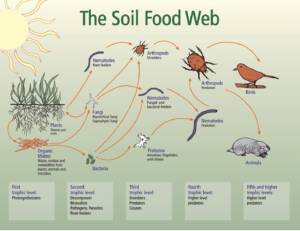Pesticides are bad. Who knew???
We’ve all heard about the harm pesticides are causing our honeybees. “Save the Pollinators!” campaigns are making great strides in raising awareness of the declining populations of bees and winged pollinators vital to our food systems and our wild habitats. However, in our focus on pesticide runoff in our water or in our air, we are missing a whole host of biodiversity in decline due to pesticides – in our soils.
A recent study in Frontiers in Environmental Science finds that pesticides of all types pose a clear hazard to billions of soil invertebrates. All plants – and those who eat them – rely on healthy soil systems to cycle nutrients from organic matter up through the food web.

Link: https://www.nrcs.usda.gov/Internet/FSE_MEDIA/nrcs142p2_049822.jpg
Beyond food and water, we also rely on soils to sequester carbon from the atmosphere. Our soils hold more carbon than all plant and animal life combined.[1] The destruction of our world’s soils through unsustainable farming practices has over the past few centuries contributed immensely to the warming of our planet, as carbon is released and oxidized upon contact with air to become CO2.
New regenerative farming practices like no-till farming, using cover crops to fix nitrogen in the soil, and planting fields with greater biodiversity provide new models for farming and planting that can revitalize our soils.
But beware the greenwashing behind some supposedly regenerative agriculture! What happens when you stop tilling soil? Weeds! And pesticide companies want you to use – guess what? – pesticides to combat those weeds. Or pesticides to kill off cover crops before you replant fields with crops. The success of thousands of organic farms demonstrates that you don’t need to use pesticides in the long run to deal with these challenges.
While most of us are planting on a much smaller scale, we too can protect our soil systems by avoiding the use of pesticides. We at Backyard Bounty never use any pesticides in our work. This approach fits in well with the guidance from Doug Tallamy’s Homegrown National Park that we’ve been talking about recently. We all need to do our part.
While avoiding pesticides might mean a longer timeline to eradicate weeds or invasive species, we know that protecting our soils from pesticides in the short term will lead to healthier soils, healthier food systems, and a healthier planet in the long term.
[1] See https://e360.yale.edu/features/soil_as_carbon_storehouse_new_weapon_in_climate_fight for more information.
